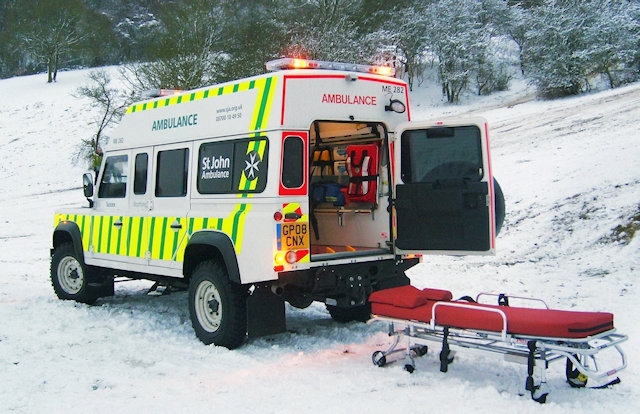St John Ambulance advises the public how to stay safe during winter
Date published: 19 December 2017

St John Ambulance
St John Ambulance has issued advice about how the public, especially the elderly and vulnerable, can stay safe during this cold period.
The leading first aid charity, is reminding the public how to deal with hypothermia and frostbite.
How to treat Frostbite and hypothermia:
Frostbite and hypothermia is rare but as some areas of the country are experiencing extremely low temperatures it’s useful to be prepared and know the symptoms.
Frostbite
Frostbite happens when part of the skin and other tissues, freeze due to low temperatures. Frostbite usually affects the fingers and toes as they are the parts of the body furthest from the heart. If someone has severe frostbite, then they might permanently lose all feeling in that part of their body. Frostbite can lead to the blood vessels and soft tissues becoming permanently damaged, leading to death of the tissue and gangrene. Frostbite usually happens in freezing or cold and windy weather. People who cannot move around are more likely to get it. Someone with frostbite will probably have hypothermia, so be prepared to treat them for that too.
What to look for:
- 'Pins and needles’
- Paleness of the area and numbness
- Hardened and stiffened skin
- Colour change to the skin. The skin may change from white to mottled and blue. On recovery, the skin may be red, hot, painful, and blistered. When gangrene occurs, the skin may become black due to the loss of blood supply.
How to treat frostbite:
- Help them indoors or somewhere warm
- Remove any constricting clothing or jewellery
- Slowly warm affected parts
- Do not rub
- Do not place on direct heat
- Place affected part in warm water
- Put on a light dressing
- Advise they take the recommended dose of paracetamol
- Call 999/112 for emergency help.
Hypothermia
Hypothermia is a condition which can happen when someone’s body temperature drops below 35°C (95°F). Normal body temperature is around 37°C (98. 6°F). Hypothermia can become life-threatening quickly, so it’s important to treat someone with hypothermia straight away. Severe hypothermia, when the body temperature falls below 30°C (86°F), is often fatal. Hypothermia can be caused by being in a cold environment for a long time. The elderly, the very young, the homeless and those who are thin, frail, or not able to move around easily are particularly vulnerable.
What to look for:
- Shivering, cold, and pale with dry skin
- Unusually tired, confused, and have irrational behaviour
- Reduced level of response
- Slow and shallow breathing
- Slow and weakening pulse.
How to treat hypothermia:
- Move them somewhere warm and sheltered
- Remove and replace wet clothes
- Cover them in blankets - If outside, protect them from the ground
- Call 999/112 for emergency help
- Monitor breathing, level of response, and temperature
- If alert, give them a warm drink or chocolate.
Do not put hot water bottles or fires near a casualty in an attempt to warm them as they may cause burns and do not give a casualty alcohol in an attempt to try to warm them because it causes blood vessels to dilate and may therefore make the hypothermia worse.
Babies have an underdeveloped mechanism for maintaining their own body temperature and may develop hypothermia easily in a cold room. You may find that they may be cold to touch, quiet and sleepy, and limp. They may also refuse to feed. To warm a baby - take them to a warm room; put warmer clothes on them. You can use blankets too.
Always seek medical advice if you think a baby has hypothermia as it could be a sign of another serious medical condition.
Do you have a story for us?
Let us know by emailing news@rochdaleonline.co.uk
All contact will be treated in confidence.
Most Viewed News Stories
To contact the Rochdale Online news desk, email news@rochdaleonline.co.uk or visit our news submission page.
To get the latest news on your desktop or mobile, follow Rochdale Online on Twitter and Facebook.

